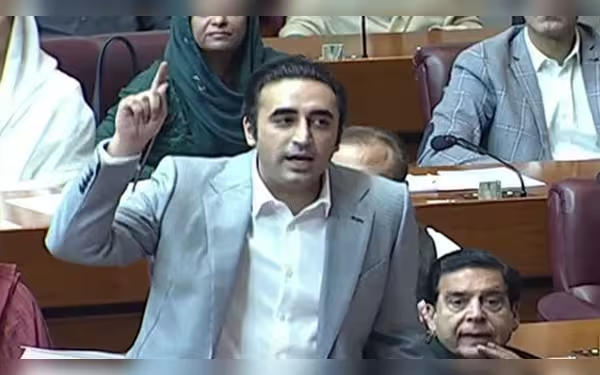Saturday, November 16, 2024 04:24 PM
Bilawal Bhutto-Zardari Rejects Urgency for Constitutional Amendments in Pakistan
- Bilawal asserts amendments are not obligatory before October 25.
- Judicial reforms require consensus among political parties.
- Coercion for votes is unacceptable, says Bilawal.
 Image Credits: geo
Image Credits: geoBilawal Bhutto-Zardari states constitutional amendments are not urgent before October 25, emphasizing the need for political consensus.
In recent discussions surrounding constitutional amendments in Pakistan, Pakistan Peoples Party (PPP) Chairman Bilawal Bhutto-Zardari has made it clear that the government’s push to pass these amendments before October 25 is "neither a necessity nor obligatory." This statement comes as the government seeks to implement reforms in the judiciary, a topic that has sparked considerable debate among political leaders and the public alike.
Bilawal, who previously served as the foreign minister, emphasized the importance of the parliamentary legislative process, asserting that the current government has the right to amend the constitution. He highlighted a significant moment in Pakistan's judicial history, noting that for the first time, a chief justice "shared his authority" with another judge during the tenure of Chief Justice of Pakistan Qazi Faez Isa. This development, according to Bilawal, reflects a shift in the judiciary's dynamics.
While expressing respect for both Justice Qazi Faez Isa and Justice Mansoor Ali Shah, Bilawal pointed out that some judges have overstepped their constitutional boundaries in pursuit of political goals. He stressed that any constitutional amendment should be adopted with consensus among all political parties, as there is no perfect scenario in politics. This stance has been a consistent position of the PPP since the beginning of discussions on judicial reforms.
Bilawal also addressed the issue of reserved seats and the government's approach to judicial reforms, stating that the government had shared its views with the judiciary before consulting its coalition partners. He reiterated that the government is justified in pursuing these reforms through constitutional amendments as soon as possible.
In a broader context, Bilawal remarked on the role of the judiciary in various institutions, noting that while the judiciary can play a significant role, the parliament should refrain from interfering in judicial matters. He also commented on the Pakistan Tehreek-e-Insaf (PTI) party, suggesting that their recent controversial statements and actions indicate a desire to undermine the government. Despite this, he extended an invitation to the PTI to share its position on the constitutional amendment, emphasizing that the doors for dialogue remain open.
Addressing concerns about the pressure on parliamentarians to vote for the constitutional amendment, Bilawal firmly stated that coercion is not the appropriate way to seek votes. He criticized the opposition for attempting to render the proposed amendment controversial and highlighted the PTI's shift from political tactics to violence, referencing their attacks in Islamabad and Lahore.
When questioned about the Supreme Court's decision regarding the PTI's electoral symbol, Bilawal distanced himself from the matter, explaining that the symbol was revoked due to the party's failure to adhere to its own constitution. He also discussed the appointment of judges, noting that the process in Pakistan differs significantly from practices in other countries, where judges are not appointed by their peers.
The ongoing discussions about constitutional amendments in Pakistan reflect a complex interplay of political interests and judicial authority. As the PPP continues to advocate for consensus and reform, the future of Pakistan's political landscape remains uncertain. The call for unity among political parties is crucial, as it could pave the way for a more stable and effective governance structure, ultimately benefiting the citizens of Pakistan.













